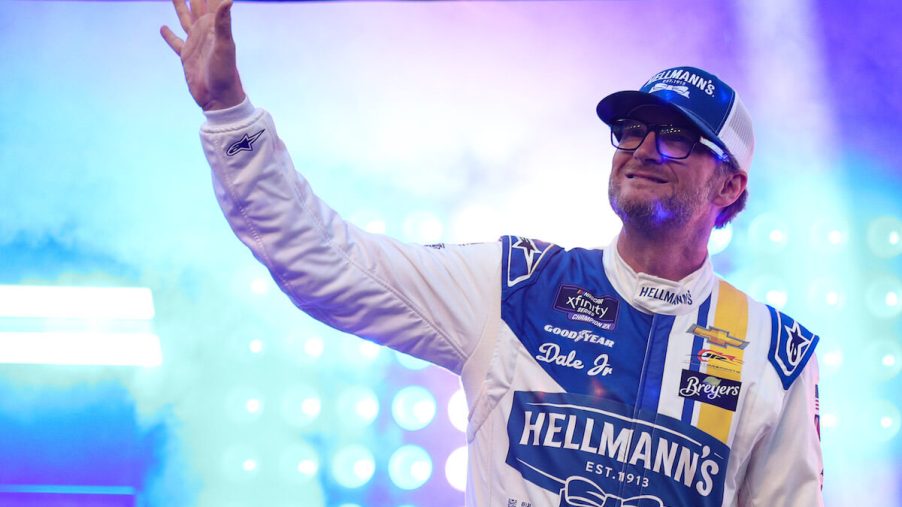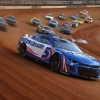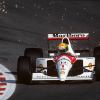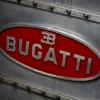
Dale Earnhardt Jr. Blames NASCAR’s Star Power Problem on Teams and Drivers, Offers Ideas on How to Fix It
NASCAR has a star problem.
The subject has become a hot topic of conversation recently, and Dale Earnhardt Jr. entered the discussion this week. He sounded off on the issue, suggesting that the teams and drivers are responsible for the lack of star power, and offered a familiar solution that will help bring the drivers back into the mainstream.
Dale Earnhardt Jr. was actively involved in growing his celebrity
During his racing career, Dale Earnhardt Jr. wasn’t a NASCAR star. He was a sports celebrity. He didn’t limit himself to NASCAR-specific publications or shows. Instead, he appeared in national mainstream publications like Playboy and Rolling Stone.
“I loved MTV. I loved Rolling Stone. I love music,” Earnhardt explained to NBC about why he included the 2000 Rolling Stone article about him in his Hall of Fame case. “I wanted that crowd to know me. So the Rolling Stone article, to me, is the one that kind of busted me out of the NASCAR bubble.”
But Junior wasn’t alone. His father preceded him on the big stage, making appearances on The Tonight Show and Late Night With David Letterman.
Jeff Gordon also got in on the action, appearing on Saturday Night Live.
Jeff Gordon offers his thoughts on sports stars
Speaking of Gordon, the four-time Cup Series champion recently made headlines for his remarks during an appearance on SiriusXM NASCAR Radio and how he viewed Denny Hamlin as a “distraction” and “too controversial.” He noted how he didn’t want the Hendrick Motorsports drivers to behave that way. The HMS vice chair proposed other ways for his drivers to get attention. It was the same business model that worked for him and others in the past.
“Again, I want other guys in the sport to do stuff like that. If they come to Hendrick Motorsports — and you can call us stiff. You can call us whatever you want,” Gordon said. “But we’re running a business, and a business is to win races first, take care of your sponsors, and let the sponsors market you. Let the sport figure out how to market you. Build your brand through who you are on social media and be the best you that you can be.”
Brad Keselowski notes how the landscape has changed
Last week, Gordon attended the Racers Forum at the NASCAR Hall of Fame, which featured panel discussions with key stakeholders on the state of the motorsports industry. Joining Gordon on a panel about growing the fan base was driver/team co-owner Brad Keselowski.
The 2012 Cup Series champion talked about star power in the sport and suggested the previous sponsor-driven promotion model isn’t as relevant in today’s business landscape. Gordon mentioned how teams don’t necessarily want to burden that responsibility because it can be a risky investment.
“Right now, there isn’t a really good ROI [return on investment] for the teams to invest — it takes a long time to invest in driver star power unless you have some inherent — you think of Chase Elliott, who had the ability to build off of a name and brand, but most drivers don’t,” Keselowski said, according to Racing America.
“That takes a significant investment from someone. In years past, that used to be the partners. I look at a guy like Rusty Wallace, and you look at the Miller Beer company and what they did for him to build his brand. That was a big investment over a lot of years. Same with Jeff and DuPont. He certainly earned it with wins to go with it, and those two connect into something very powerful. I think our partners are less willing to do that than they were in years past, so that really puts the burden on the team to do so. And I think that’s a huge burden for them, and to that point, if a driver leaves, it’s a big loss in that investment, which is not great. And they don’t get anything long-lasting value out of it.”
Dale Earnhardt Jr. places blame for lack of star power and offers ideas for resolution
This week on his Dale Jr. Download podcast, Earnhardt talked about NASCAR’s star power at length with co-host Mike Davis. Their conversation touched on the past, present, and what could help improve star power in the future.
“I don’t think Brad, as an owner, should feel any responsibility to spend money, invest on creating a star,” Earnhardt said. “I think he should be asking these partners to do what they can and use that driver wherever possible. That that driver is available to them. You have put your name on this car; I will make my driver go wherever you need him to be. And if that can actually help introduce him to more people, whether that’s a national media spot or going to their national sales convention in front of 10,000 of their employees, whatever, right? I need you to tell me, and he’s yours.”
Earnhardt is referring to his own experiences as an example. Davis, like Keselowski, pointed out how there’s been a shift in how PR is handled. It’s now in-house and managed by the teams, which can sometimes be problematic.
“Because then what happens when it’s race-team controlled, the driver can start to manipulate things quite a bit,” Earnhardt said.
“Thank you,” Davis agreed. “And that’s what’s happened.”
“And now the driver’s like, ‘Yeah, I’m not available,'” the NBC analyst said.
Earnhardt and Davis agreed that in order to prevent the driver from “manipulating” the situation, a conversation needs to be had where the responsibility for promotion shifts back to the sponsors, with NASCAR’s blessing on said promotion like it was back in the day.
“I mean, I think that would have to be a better way for it to work because the sponsors are the ones really with the better connections to the media, right? To magazines,” Earnhardt said.
It’s an ongoing debate that doesn’t have a simple solution. But it’s a solution that must be figured out sooner rather than later because the future of the sport and its growth depend on it.
To stay up to date on the latest happenings in NASCAR, including breaking stories you can’t find anywhere else, follow Kyle on YouTube and Twitter.



